For 76 years since Pakistan’s establishment, crises have come and gone. Despite being an agricultural country with 70% of its population involved in farming, Pakistan still faces frequent food shortages, especially with wheat and sugar. We export these commodities for profit and then import them again at higher prices. Edible oil is imported from Malaysia, and pulses come from Australia. Although we have potential oil reserves and rich marine resources, we still rely heavily on imports.
Our fishermen are struggling with outdated wooden boats, while foreign trawlers with modern ships are looting our seas. The wheat crisis, however, is the most recurrent issue. It seems there are always hidden agendas and corrupt practices behind it.
Last year, during Prime Minister Shahbaz Sharif’s first term, a bureaucrat named Muhammad Mahmood suggested that Pakistan needed to procure more wheat. This decision was delayed and then hastily approved during the caretaker government led by Anwar-ul-Haq Kakar. This allowed wheat to be imported from Ukraine, even though our warehouses were already full with last year’s surplus.
Despite the import, the price of wheat remained high. Farmers sold their produce for much lower prices than the government rate, losing out significantly. The Punjab government set the wheat price at Rs 3,900 per maund, while the Sindh government set it at Rs 4,000, but farmers received only Rs 2,900 to Rs 3,200 due to middlemen exploiting the situation.
The blame game continues, with current and former governments accusing each other of mismanagement. An inquiry committee has been formed, but such committees often serve to deflect blame rather than provide solutions. In the meantime, farmers suffer, struggling to sell their crops at fair prices and dealing with the constant threat of financial ruin.
The situation is dire, with corrupt officials and middlemen profiting at the expense of hardworking farmers. Until real accountability and effective measures are implemented, the cycle of crises will continue, leaving the farmers and the general population to bear the brunt of these failures.

